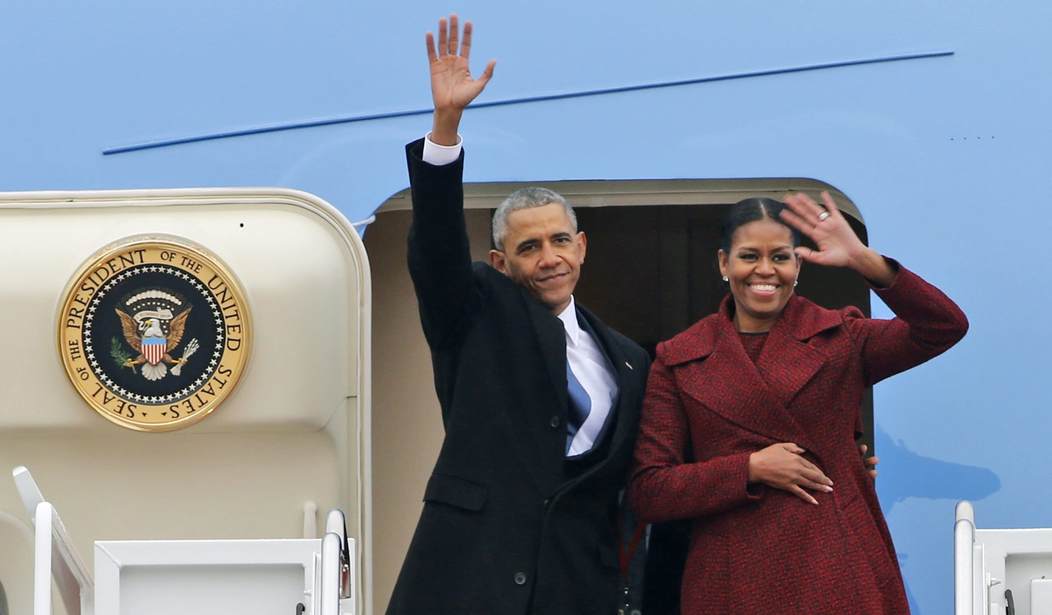Michelle Obama raged against the risk of her “integration and/or assimilation into a White cultural and social structure” in her Princeton University thesis. I reviewed this document, remarkable for its rancor as well as for its orthographical dysfunction, during her husband’s first presidential campaign ten years ago. Now that Mrs. Obama has emerged as a prospective candidate for the 2020 presidential election, her radical rant is worth another look.
Below is my 2008 Asia Times essay.
Sing, O Muse, the Wrath of Michelle
By Spengler
The wrath of swift-footed Achilles, of which Homer called his muse to sing, nearly lost the Trojan War for the Greeks. The wrath of swift-tongued Michelle Obama well might lose the White House for her husband. We had a peek into her diary last week when the Obama campaign finally made public her undergraduate thesis, titled “Princeton-Educated Blacks and the Black Community.” The contents of this remarkable document sharpen the profile of Obama’s women that I offered last week (“Obama’s women reveal his secret” Asia Times Online, February 26.)
Barack Obama, I argued, evinces a preternatural sangfroid, for he is in America but not of it, a Third World anthropologist profiling
Americans. But his wife’s anger at America will out, for it is a profound rage amplified by guilt.
Mrs Obama averred that she could not recall the contents of the thesis she composed in 1985, but that cannot be quite true, for it is a poignant cry from the heart. It explains her controversial outburst during the campaign to the effect that she felt proud of her country for the first time in her adult life in 2008, after “feeling so alone” in her “frustration” and “disappointment” at America.
Princeton both humiliated her and corrupted her, Michelle Vaughn Robinson complains in an undergraduate prose that is all the more touching for its clumsiness. By condescending to the young black woman from a Chicago working-class family, the liberal university made Michelle feel like an outsider. Worse, by giving her a ticket to financial success, Princeton caused her to feel that she was selling out to the institutions she most despised.
Michelle’s ambivalence towards Princeton, and by extension towards America, has the makings of a tragedy of the sort found in the novels of Theodore Dreiser or F Scott Fitzgerald, a fatal compromise in pursuit of status. Young Michelle felt she was betraying “lower class Blacks” by assimilating:
… the path I have chosen to follow by attending Princeton will likely lead to my further integration and/or assimilation into a White cultural and social structure that will only allow me to remain on the periphery of society, never becoming a full participant. This realization has presently made my goals to actively utilize my resources to benefit the Black community more desirable.
Nonetheless, she was drawn moth-like to the flame of success:
At the same time, however, it is conceivable that my four years of exposure to a predominantly White, Ivy League University has instilled within me certain conservative values. For example, as I enter my final year at Princeton, I find myself striving for many of the same goals as my White classmates – acceptance to a prestigious graduate or professional school or a high paying position in a successful corporation. Thus, my goals after Princeton are not as clear as before.
Hopelessness, young Michelle sought to demonstrate, afflicts black Princeton students who are torn between loyalties to the black community and the pursuit of success. Her thesis tabulated the results of a questionnaire sent to black students at Princeton on their attitudes towards the black community and themselves. She drew a bright line between “separatist-pluralist” attitudes, that is, rejecting assimilation into white America, and an “integrationist-assimilationist” stance. Clearly her sympathies lay with black separatism.
The idea of separationism and pluralism (both cultural structural and social structural) is also discussed by Billingsley (1968) who believes there is a need for Blacks to build up their own communities, define themselves by new “Black” standards different from the old White standards and exercise power and control over their own institutions and services within the Black community.
Stokely Carmichael and Charles Hamilton’s [sic] (1967) developed definitions of separationism in their discussion of Black Power which guided me in the formulation and use of this concept in the study: “The concept of Black Power rests on the fundamental premise: Before a group can enter the open society, it must close ranks.”
It was black separatists, she concluded, who cared about the black community, whereas integrated blacks turned their backs on it:
… the more respondents became sep[aratist]/plur[alist], during the Pre-to-Prin period [prior to attending Princeton], the more respondents became motivated to benefit the Black community; and the more int[egrated]/assim[imilated] they became, the more unmotivated they became to benefit the Black community.
Universities such as Princeton, moreover, rig the system for the benefit of whites, as she favorably quoted Dr Carolyn Dejoie:
Institutional policies of predominantly White Universities have established practices which favor the preferred groups and have ranked priorities which are meant to facilitate the tasks and improve the conditions of White students while ignoring the needs of the Black students … Fraternities, sororities, homecoming activities and student government maintain the White status-quo [sic]. As in academic areas, the social aspects of university life systemically follow the interests of White students – the majority group.
Although the black separatists are the ones who care about the black community, she continues, their sense of loyalty and concern also inspires a sense of hopelessness. That is an unexpected and highly personal conclusion. Her prose chokes up and her spelling breaks down as she writes of this hopelessness:
[The data] demontate [sic] a strong relationship for [sic] the change in ideologies during the Pre-to-Prin period and the feeling that the situation of the Black lower class is hopeless, such that the more responds became sep[aratist]/plur[alist], the more respondents; and the more respondents became int[egrated]/assim[imilated], the less hopeless they felt.
My speculation for this finding is based on the possibility that a separationist is more likely to have a realistic impression of the plight of the Black lower class because of the likelihood that a separationist is more closely associated with the Black lower class than are integrationist [sic]. By actually working with the Black lower class or within their communities as a result of their ideologies, a separationist [sic] may better understand the desparation [sic] of their [sic] situation and feel more hopeless about a resolution as opposed to an integrationist who is ignorant to [sic] their plight.
Michelle did not imagine the contempt with which the white liberal professors of Princeton regarded black students, for the above passage was preserved in the final version of the thesis stored by the university, errors and all.
Black students who reject white society, she concluded, understand the desperation of the black lower class, and therefore feel hopeless, whereas assimilated blacks ignore this desperation and therefore are more cheerful. It is hard not to admire the young black woman whose indignation over the predicament of the black lower class bursts out of the bland style of academic sociology, and who throws the condescension of her white liberal professors back in their faces. But that is not what afflicted the future Michelle Obama.
To the young Michelle’s sense of hopelessness about the prospects for the black lower class, Princeton added something even worse, namely guilt over “striving for many of the same goals as my White classmates – acceptance to a prestigious graduate or professional school or a high paying position in a successful corporation”. Despite her black separatist sympathies, Michelle Vaughn Robinson succumbed to the temptations of which she wrote in her thesis and got a law degree from Harvard, earning around $400,000 a year in salary and corporate director fees by 2005.
Her “hopelessness”, “frustration” and “disappointment” remain, exacerbated by guilt over her own success. That is not speculation, but a precis of her own account. One might speculate that the guilt became all the more poignant to the extent her success was unearned. Michelle Obama’s employer, The University of Chicago Hospitals, paid her $121,910, a reasonable sum for the skill level evident in her thesis, but raised this to $316,952 shortly after her husband was elected US senator.
Unlike her husband, whose focus on his audience is unwavering, Michelle Obama remains at the mercy of the same internal conflict that she reported in her senior thesis. She is too bitter at the hopelessness of lower-class blacks to assimilate, but too attracted to money and privilege to reject white society. She hates the white institutions that made her prosperous, not only because they cannot solve the problems of the black lower class, but even more so because they made her feel guilty about her own success.
These internal conflicts help explain Michelle Obama’s erratic behavior. Despite her own financial success, Michelle Obama continues to preach austerity and self-sacrifice to others. Speaking before a working-class audience in Ohio on February 29, she urged her listeners to eschew corporate law or hedge-fund management, which was odd, because most of them did not have a high-school diploma, let alone a university degree:
We left corporate America, which is a lot of what we’re asking young people to do. Don’t go into corporate America. You know, become teachers. Work for the community. Be social workers. Be a nurse. Those are the careers that we need, and we’re encouraging our young people to do that. But if you make that choice, as we did, to move out of the money-making industry into the helping industry, then your salaries respond … many of our bright stars are going into corporate law or hedge-fund management [quoted by Byron York in The National Review Online].
But she did not leave corporate America. She did leave the corporate law firm that hired her out of Harvard Law School, but there is no reason to believe that idealism drove that decision. The major law firms make partners out of a fifth of their new hires, who slave for years for the opportunity. Michelle Obama was not partner material for a top firm. She took more than a year to pass the Illinois Bar Examination, a substandard result, and – as her thesis makes clear – lacked the command of written English required for legal success. Her skills were better suited to the hospital position she eventually filled. Not only did she sell out, but she sold out for mediocre results.
Bitterness over the meager price that the white power structure offered for her soul nags at Michelle Obama. At the Ohio speech cited by NRO’s York, she complained, “The salaries don’t keep up with the cost of paying off [student loans], so you’re in your 40s, still paying off your debt at a time when you have to save for your kids … Barack and I were in that position. The only reason we’re not in that position is that Barack wrote two best-selling books … It was like Jack and his magic beans. But up until a few years ago, we were struggling to figure out how we would save for our kids.”
But it was not only Senator Obama’s writing income, it was Michelle’s $200,000 salary increase and corporate directorships following his election to the US Senate that made the family prosperous. And it wasn’t just piano lessons and summer camp, but a mansion in the Chicago suburb that represented an adequate price for Michelle’s soul.










Join the conversation as a VIP Member